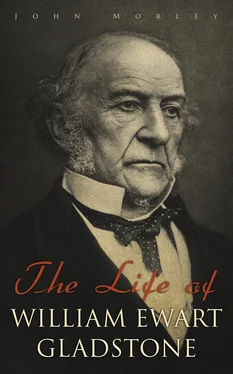ESSAY CLUB
An Essay Club, called from its founder's initials the WEG, was formed at a meeting in Gaskell's rooms in October, 1829. Only two members out of the first twelve did not belong to Christ Church, Rogers of Oriel and Moncreiff of New. 45The Essay Club's transactions, though not very serious, deserve a glance. Mr. Gladstone reads an essay (Feb. 20, 1830) on the comparative rank of poetry and philosophy, concluding with a motion that the rank of philosophy is higher than that of poetry: it was beaten by seven to five. Without a division, they determined that English poetry is of a higher order than Greek. The truth of the principles of phrenology was affirmed with the tremendous emphasis of eleven to one. Though trifling in degree, the influence of the modern drama was pronounced in quality pernicious. Gladstone gave his casting vote against the capacious proposition, of which philosophers had made so much in France, Switzerland, and other places on the eve of the French revolution, that education and other outward circumstances have more than nature to do with man's disposition. By four to three, Mr. Tennyson's poems were affirmed to show considerable genius, Gladstone happily in the too slender majority. The motion that 'political liberty is not to be considered as the end of government' was a great affair. Maurice, who had been admitted to the club on coming to Oxford from Cambridge, moved an amendment 'that every man has a right to perform certain personal duties with which no system of government has a right to interfere.' Gladstone 'objected to an observation that had fallen from the mover, “A man finds himself in the world,” as if he did not come into the world under a debt to his parents, under obligations to society.' The tame motion of Lord Abercorn, that Elizabeth's conduct to Mary Queen of Scots was unjustifiable and impolitic, was stiffened into 'not only unjustifiable and impolitic, but a base and treacherous murder,' and in that severe form was carried without a division.
Plenty of nonsense was talked we may be sure, and so there was, no doubt, in the Olive Grove of Academe or amid those surnamed Peripatetics and the Sect Epicurean. Yet nonsense notwithstanding, the Essay Club had members who proved in time to have superior minds if ever men had, and their disputations in one another's rooms helped to sharpen their mental apparatus, to start trains of ideas however immature, and to shake the cherished dogmatisms brought from beloved homes, even if dogmatism as stringent took their place. This is how the world moves, and Oxford was just beginning to rub its eyes, awaking to the speculations of a new time.
When he looked back in after times, Mr. Gladstone traced one great defect in the education of Oxford. 'Perhaps it was my own fault, but I must admit that I did not learn when I was at Oxford that which I have learned since—namely, to set a due value on the imperishable and inestimable principle of British liberty. The temper which too much prevailed in academical circles was that liberty was regarded with jealousy and fear, something which could not wholly be dispensed with, but which was to be continually watched for fear of excesses.' 46
III
TRIES FOR THE IRELAND SCHOLARSHIP
In March 1830 Gladstone made the first of two attempts to win the scholarship newly founded by Dean Ireland, and from the beginning one of the most coveted of university prizes. In 1830 (March 16) he wrote:—'There is it appears smaller chance than ever of its falling out of the hands of the Shrewsbury people. There is a very formidable one indeed, by name Scott, come up from Christ Church. If it is to go among them I hope he may get it.' This was Robert Scott, afterwards master of Balliol, and then dean of Rochester, and the coadjutor with Dean Liddell in the famous Greek Lexicon brought out in 1843. A year later he tried again, but little better success came either to himself or to Scott. He tells his father the story (March 16th, 1831) and collegians who have fought such battles may care to hear it:—
I must first tell you that I am not the successful candidate, and after this I shall have nothing to communicate but what will, I think, give you pleasure. The scholarship has been won by (I believe) a native of Liverpool. 47His name is Brancker, and he is now actually at Shrewsbury, but had matriculated here though he had not come up to reside. This result has excited immense surprise. For my own part, I went into the examination solely depending for any hope of pre-eminence above the Shrewsbury men on three points, Greek history, one particular kind of Greek verses, and Greek philosophy.... It so fell out, however, that not one of these three points was brought to bear on the examination, though, indeed, it is but a lame one without them. Accordingly from the turn it seemed to take as it proceeded, my own expectations regularly declined, and I thought I might consider myself very well off if I came in pretty high. As it is, I am even with the great competitor, Scott, whom everybody almost thought the favourite candidate, and above the others. Allies, an Eton man, Scott and I are placed together; and Short, one of the examiners, told us this morning that it was an extremely near thing, and he had great difficulty in making up his mind, which he never had felt in any former examination in which he had been engaged; and indeed he laid the preference given to Brancker chiefly on his having written short and concise answers, while ours were longwinded. And in consideration of its having been so closely contested, the vice-chancellor is to present each of us with a set of books.... Something however may fairly enough be attributed to the fact that at Eton we were not educated for such objects as these.... The result will affect the scholarship itself more than any individual character; for previous events have created, and this has contributed amazingly to strengthen, a prevalent impression that the Shrewsbury system is radically a false one, and that its object is not to educate the mind but merely to cram and stuff it for these purposes. However, we who are beaten are not fair judges.... I only trust that you will not be more annoyed than I am by this event.
Brancker was said to have won because he answered all the questions not only shortly, but most of them right, and Mr. Gladstone's essay was marked 'desultory beyond belief.' Below Allies came Sidney Herbert, then at Oriel, and Grove, afterwards a judge and an important name in the history of scientific speculation.
He was equally unsuccessful in another field of competition. He sent in a poem on Richard Cœur de Lion for the Newdigate prize in 1829. In 1893 somebody asked his leave to reprint it, and at Mr. Gladstone's request sent him a copy:—
On perusing it I was very much struck by the contrast it exhibited between the faculty of versification which (I thought) was good, and the faculty of poetry, which was very defective. This faculty of verse had been trained I suppose by verse-making at Eton, and was based upon the possession of a good or tolerable ear with which nature had endowed me. I think that a poetical faculty did develop itself in me a little later, that is to say between twenty and thirty, due perhaps to having read Dante with a real devotion and absorption. It was, however, in my view, true but weak, and has never got beyond that stage. It was evidently absent from the verses, I will not say the poem, on Cœur de Lion; and without hesitation I declined to allow any reprint. 48
DEBATES AT THE UNION
He was active in the debates at the Union, where he made his first start in the speaking line (Feb. 1830) in a strong oration much admired by his friends, in favour,—of all the questionable things in the world,—of the Treason and Sedition Acts of 1795. He writes home that he did not find the ordeal so formidable as it used to be before the smaller audiences at Eton, for at Oxford they sometimes mustered as many as a hundred or a hundred and fifty. He spoke for a strongly-worded motion on a happier theme, in favour of the policy and memory of Canning. In the summer of 1831, he mentions a debate in which a motion was proposed in favour of speedy emancipation of the West Indian slaves. 'I moved an amendment that education of a religious kind was the fit object of legislation, which was carried by thirty-three to twelve.' Of the most notable of all his successes at the Union we shall soon hear.
Читать дальше









![William Frith - John Leech, His Life and Work. Vol. 1 [of 2]](/books/747171/william-frith-john-leech-his-life-and-work-vol-thumb.webp)


![William Frith - John Leech, His Life and Work, Vol. 2 [of 2]](/books/748201/william-frith-john-leech-his-life-and-work-vol-thumb.webp)